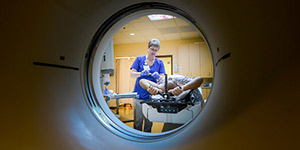Clinical Trials at GBMC
Groundbreaking clinical research led by dedicated physicians, clinicians and global partnerships
The William E. Kahlert Research and Discovery Fund
GBMC has a comprehensive program of clinical trials in various medical disciplines throughout the hospital. The GBMC Institutional Review Board (IRB), is an independent ethics committee which meets monthly to evaluate clinical trial proposals by medical staff members. The emphasis of IRB review includes ethical standards, patient safety, patient confidentiality, and scientific merit.
Research sponsors for clinical trials at GBMC include NIH (NIDDK, NCI, etc.), independent investigators, and pharmaceutical trials. Clinical trials involve not only therapeutic interventions but also medical devices, laboratory testing, and other investigations of current medical and surgical practice.
Research emphasis at GBMC includes oncology, endocrinology, speech-language pathology, women's health, ophthalmology, genetics, and surgical subspecialties.
Patient Resources
GBMC investigators offer some of the most cutting edge treatment options available to those who are eligible and interested in participating. Through clinical trials, participants have the opportunity to explore treatment options not yet approved by the FDA and contribute to medical advancements that may benefit generations to come.
The FDA reviews and approves all investigational drug studies prior to initiating a given study at any U.S. location. Physicians offering clinical trials follow strict FDA guidelines to ensure patient safety is protected. All trials are approved for use by an Institutional Review Board (IRB) whose main function is to protect patients from unreasonable harm and side effects. The GBMC IRB reviews all open clinical trials on a continuous basis. Patients participating on clinical trials are monitored closely and reportable serious side effects are communicated to the study sponsor and IRB expeditiously.
 It is important to weigh your options carefully when deciding whether or not to participate in a clinical trial. Take the time to fully understand the clinical trial and weigh the potential benefits and risks before you decide to participate. A clinical professional will take the time to discuss the clinical trial option with you and should answer any questions you have. A participant informed consent will be provided to you which includes detailed information about the study. By signing the consent form you are agreeing to participate, although consent may be withdrawn at any time.
It is important to weigh your options carefully when deciding whether or not to participate in a clinical trial. Take the time to fully understand the clinical trial and weigh the potential benefits and risks before you decide to participate. A clinical professional will take the time to discuss the clinical trial option with you and should answer any questions you have. A participant informed consent will be provided to you which includes detailed information about the study. By signing the consent form you are agreeing to participate, although consent may be withdrawn at any time.
After the initial discussion about a clinical trial, you may want to take the informed consent form home to review, potentially discuss with your family members, and create a list of questions to ask. Someone from the research team should contact you when you've had sufficient time to review the information to determine whether or not you are interested in participating. Before participation you should make sure that your questions have been addressed to your satisfaction. Once you have read the informed consent and discussed the study with your healthcare professional, you should have answers to the basic questions listed here.
What is the study for and what is the purpose of the research?
It's important to know how valuable your participation will be to the study. Ask your provider as many questions you'd like to determine if this study is something you are interested in.
What are the required procedures and timeframes and are you able and willing to comply with these requirements?
Clinical trials usually have very specific requirements to analyze the effects of what is being studied and to monitor your safety. You should understand what these requirements are and be sure that you will be able to comply with the requirements before agreeing to participate. Treatment studies may also monitor your health for a period of time after the treatment is finished, and you may need to come in to see your physician for office or clinic appointments at specific time intervals after your treatment is finished. Be sure you understand what these requirements are before agreeing to the study.
What are the reasonably foreseeable risks or discomforts to the clinical trial?
Risks and discomforts can range from none to many depending on the medication or intervention being studied. Often, such side effects are similar to complications of standard therapies. As a rule, the benefits should outweigh the risks in any clinical trial. However, you should review these risks to make sure you understand what the potential complications are and ask any questions you may have.
What are the potential benefits to participating?
Potential benefits, or lack there of should be understood before participation. If the study involves treatment, are there other options to consider? When other treatment options are available for your condition, these should be discussed so you can decide which treatment option is best.
Who will have access to your medical records?
This should be described in the patient informed consent or a research-specific HIPAA form. At a minimum, those required to have access to your medical records for research purposes will include the institution where you are participating in the research, any outside research sponsor (if applicable), and monitoring agencies which are responsible for ensuring that the study is being conducted accurately, including the FDA. Any other groups requiring access will be stated in the informed consent form.
Who can you contact for questions and in case any research-related injury occurs?
This information should be listed in the informed consent. You should always contact the primary physician who entered you onto the clinical trial. Research-related injuries are important to know about not only for your own safety, but also for anyone else being treated on the same study or other studies using the same drugs or devices.
Will there be any extra costs for participating in the research?
It is important to know if you will be responsible for any extra costs. Before enrolling in the clinical trial, talk to your study contact person about who will pay any trial related costs and if your insurance will continue to cover standard procedures.
How long will the clinical trial last?
This can be a two-part question. If the clinical trial is studying the effects of a therapy, you should find out how long you will be on this therapy. Most therapy clinical trials, especially medication studies, will also follow your progress for a period of time after you have completed treatment. This may be months, years, or a lifetime. This "follow-up" period may require a physical exam, or may only be a phone call to find out how you are. You can consult the informed consent or your physician to find out how long the trial will last.
General Clinical Trials Questions
What are clinical trials?
Clinical trials are studies designed to test new methods for treatment and prevention of specific conditions and related symptoms. Through clinical trials, physicians and researchers make progress toward improving the outcome and quality of life for a variety of participants. Trials may answer important questions regarding the value of newly discovered treatments. A team of experts monitors clinical trials. Patients are fully informed of all risks and benefits of treatment prior to participation and participants are monitored closely throughout the course of the study.
What are the types of clinical trials?
- Treatment trials test a new drug or procedure to improve treatment.
- Prevention trials test new interventions designed to prevent the occurrence of a predisposed condition in high-risk individuals.
- Device trials test new medical devices which may require surgical placement.
- Comparative effectiveness research is the direct comparison of existing health care interventions to determine which work best for a particular indication and which provide the greatest benefit.
What are the phases of clinical trials?
Clinical trials evaluate new therapies in four sequential phases to determine their usefulness in future clinical practice. Each study phase must prove that the drug is safe and at least as effective as standard treatment in order to move to the next sequential phase. The main phases include:
- Pilot Study: A pilot study aims to gain initial information to help design the structure of a future study. These take a "first look" at a new idea, usually involve a small number of people, and are conducted over a short period of time.
- Phase I: In the first phase, humans are given new drugs for the first time. The new drug is tested to establish safety, the maximum tolerated dose and the optimal schedule of administration.
- Phase II: Once safety has been established, phase II trials are established to evaluate the effectiveness of treatment in the indication being studied. Side effects and optimal dosing schedules are further identified from the phase I study.
- Phase III: The goal of phase III studies is to build on knowledge gained during phase I and II studies and compare the new treatment to standard established treatments. Phase III studies involve many more patients and often take years to complete, but will ultimately help to improve and redefine the standard of care.
- Phase IV: These studies seek to expand the current usage of an approved drug to evaluate other indications that might prove beneficial and to expand our appreciation of side effects.
Who can participate?
Your physician may approach you with a clinical trial option for treatment if he/she thinks this option may be right for you. In order to protect patients' safety, individuals must meet very specific criteria in order to participate. The choice is voluntary and all advantages and disadvantages are discussed as part of the consent process. An individual may discontinue the trial at any time by his/her own choice or at the discretion of the treating physician.
Why is participation important?
Clinical trials assist clinicians in identifying new treatments that lead to improved survival and better quality of life for patients. Participants have access to state-of-the-art therapies that may not yet be available to the general public and participation will improve treatment options for future generations.
What if I don't feel comfortable with participating?
You will still receive the same level of excellent care from your physician even if you do not agree to participate in a clinical trial. A clinical trial should be presented to you as one option for treatment. Although your physician is participating in the clinical trial because he/she believes that the study is helpful for you, he/she will also understand if you decide not to participate and will never treat you any differently based on your decision.
Questions You May Have While on a Trial
Why am I being asked to sign another consent form when I've already signed one of these?
Not infrequently, a clinical trial protocol is amended over the course of the study. There may be minor changes that would not affect your treatment or major changes that might change the treatment program. Also, over time, new information regarding side-effects of the medication being studied may be recognized that should be included in the informed consent. When protocol changes or important new information is found, you will be notified and asked to either sign an updated consent form or summary of changes document to acknowledge that you are aware of the updates and/or amendments. This provides documentation that you have been educated about the new knowledge or protocol changes. This does not mean that you are being entered into a new study.
I just received a bill for a procedure that my insurance company has denied. What do I do?
Before enrolling in the trial, you should know who will pay any trial related costs. Billing requirements and procedures can be complex in a clinical trial. During the trial, if you have questions about a bill you have received and whether or not it is your responsibility, please bring it to your study contact person for investigation.
The following web links may be helpful in finding more information on clinical trials and to search nationally for available clinical trials for specific diseases or conditions:
- National Institutes of Health registry of clinical trials conducted nationwide and globally. Find clinical trials using search terms, location, principal investigator, etc.
http://clinicaltrials.gov - United States Department of Health and Human Services, Office for Human Research Protections (OHRP)
www.hhs.gov/ohrp - Patient Resources Publishing
http://www.patientresource.net/Clinical_Trials.aspx
Related Services

Breast Care - Sandra & Malcolm Berman Comprehensive Breast Center at GBMC
6715 N. Charles St
Suite 250
Towson, MD 21204
Phone: (443) 849-2600

Medical Oncology at GBMC
6715 N. Charles St
Sandra R. Berman Pavilion - Suite 125
Towson, MD 21204
Phone: (443) 849-3051

Cancer Services at GBMC - Sandra and Malcolm Berman Cancer Institute
6715 N. Charles St
Sandra R. Berman Pavilion
Towson, MD 21204
Phone: (443) 849-3051

Head and Neck Surgery
6569 N. Charles St.
Pavilion West, Suite 401
Towson, MD 21204
Phone: (443) 849-8940

Thoracic Surgery at GBMC
6715 N. Charles St.
Sandra R. Berman Pavilion - Suite 125
Towson, MD 21204
Phone: (443) 849-3470

Radiation Oncology at GBMC
6701 N. Charles St.
Main Hospital, Suite 1400
Towson, MD 21204
Phone: (443) 849-2540

Infusion Therapy at GBMC
6715 N. Charles St.
Sandra R. Berman Pavilion - Suite 125
Towson, MD 21204
Phone: (443) 849-3051




